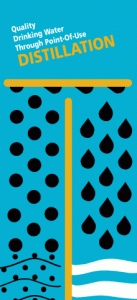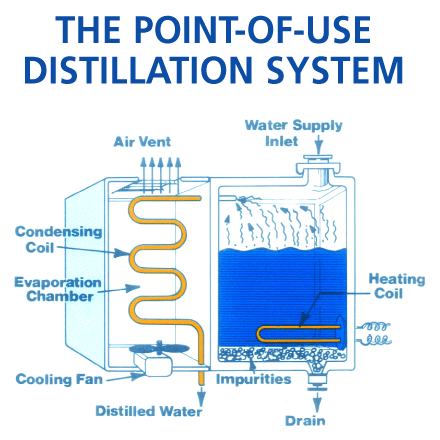Point-of-Use Distillation

Discover Distilled Water
Nothing quenches the thirst like a refreshing glass of water filled with crystal-clear ice cubes. It almost makes you thirsty just thinking about it! But clear water doesn’t just happen. Called the “universal Solvent”, water dissolves a little of everything it comes in contact with…from chemicals to naturally occurring magnesium and calcium that can produce “hard water,” to chlorine which is used to kill water-borne bacteria. Point-of-use distillation is an effective way to reduce unwanted minerals, chemicals, and tastes from your water.
How Point-of-Use Distillation Works
A distillation system raises the water temperature to boiling. At this point, the water turns to vapor, generally leaving behind contaminants that may have been dissolved in it, as well as microscopic solids or organic materials. The clean water vapor (steam) then enters a condenser where it is cooled and returned to a liquid state. This produces clean, clear water with a distinctive clarity, as well as a reduction of unwanted contaminants.
Questions and Answers about Point-of-Use Distillation Systems
Q: Is water beneficial to my diet?
A: Yes. Water makes up 70% of your body weight, so it makes good sense to add quality water to your diet. An essential element for you good health, water flushes toxins from your body and can contribute to your general wellbeing. In fact, nearly every program for fitness and health contains a prescription for six to eight glasses of clean, clear water per day.
Q: How does distilled water differ from untreated tap water??
A: Distillation significantly reduces waterborne contaminants such as those listed in this brochure which may invade home wells or water supplies. It can provide a final barrier of protection in your home for your cooking and drinking water.
Q: Is it possible to maintain a sodium-free diet and still have all the benefits of soft water?
A: Yes. Point-of-use distillation reduces sodium in water. Installing distillation units for the kitchen and other drinking water taps offers a supply of low sodium water for cooking and drinking, without losing the many benefits of whole-house softwater for bathing, laundry, and cleaning.
Q: Why does distilled water taste different than untreated tap water?
A: Water is essentially tasteless. The “flavor” you’ve grown accustomed to is likely from the various chemicals and minerals that are present in the water. Distilled water has a distinctive, clean taste since contaminants, dissolved solids, and chlorine are reduced during the distillation process. When used for cooking, distilled water can allow the food’s natural flavor to come through.
Q: Doesn’t cooking automatically “boil out” bad taste in water?
A: No. Simply boiling water may actually concentrate the undesirable materials because it reduces the amount of water. It can also amplify the objectionable taste. Distillation, on the other hand, collects the clean, clear steam which is condensed back into a liquid form.
Q: Does distilled water extend the life of my appliances?
A: Since distilled water is virtually free of the minerals and salts that can cause corrosion and scaling, appliances may operate more efficiently. Distilled water can also help minimize the damaging scale build-up on the heating elements, Thus increasing product life. Check product manufacturer guidelines on water use and be sure to follow maintenance recommendations.
Q: Will distillation remove all contaminants from my water?
A: Distillation is a highly effective process. The level of contaminant reduction will vary, depending on conditions such as the degree of contamination, the size and type of equipment, and product maintenance. No system can be warranted for total elimination of all contaminants in all conditions. Consult your local WQA professional or the manufacturer for specific information.
Q: Are point-of-use distillation units economical?
A: The cost of home distillation units may vary by manufacturer, and features and uses for distilled water may vary by household. When considering value, home distillation units offer many advantages. Among these are convenience longer life for some appliances improved water quality and perhaps, even better tasting foods and drinks. It should be noted that most types of water distillers do require periodic cleaning. But, with the exception of activated carbon or sediment filters usually used with today’s distillation systems, there are no other components that require replacement to ensure proper operation.
Reduces:
- Unpleasant Tastes
- Unpleasant Odors
- Scale Producing Minerals
- Lead
- Copper
- Sodium
- “Cloudy/Foggy” Appearance
- Nitrates
- Certain Pesticides and Fungicides
- Certain Volatile Organisms Contaminants
Information
Consumer Tips
If you are considering the purchase or rental of point-of-use (POU) water quality improvement equipment, here are a few consumer tips from the Water Quality Association (WQA):
- If you suspect you have a problem with your water, have it tested to confirm the nature and extent of the problem. For aesthetic problems like hardness, your water can be analyzed in your home by a professional such as a WQA Certified Water Specialist (CWS); for health concerns, consult a state certified or other reputable laboratory.
- Research the water quality improvement products available before you buy. Check performance capabilities, warranty, maintenance provisions, and general operation. Be an educated consumer.
- Price is an important factor, but don’t let it be your only criteria. Capacity, special features or company services may make a more expensive product a more appropriate choice.
- All products require maintenance. Some technologies also require periodic component replacement. Determine whether you or the dealer will perform these functions.
- Look for the WQA Gold Seal on the POU equipment. It indicates the product met industry standards by sample testing.
- Research the reputation and legitimacy of the company or sales representative you choose. You may want to check customer references before you sign a contract.
- Multiple water quality problems may require multiple product solutions, a “systems” approach which combines several technologies in one system.
- Some in-home water tests can look spectacular, but the findings have little significance. Ask what’s being determined by a test and what it means to you.
- Deal with a professional, such as a WQA certified professional. Check your telephone directory or write WQA.
- Look for a company that supports the POU Industry Voluntary Product Promotion Guidelines and Professional Standards as published by WQA.



